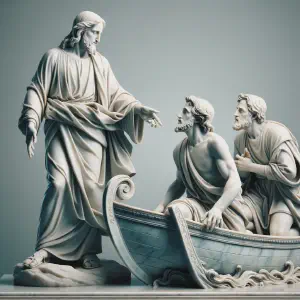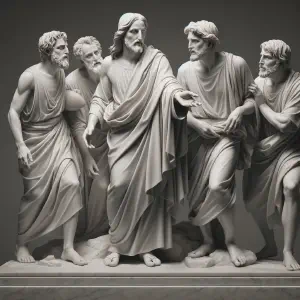The Call and the Promise



The psalmist, in a distant time, sang of the Lord’s perfect law, of decrees and precepts that rejoiced the heart and enlightened the eye. The fear of the Lord was described as pure, the ordinances as true and just, more precious than gold and sweeter than honey. This ancient song echoed through the ages, finding its fulfillment in the words and deeds of Jesus, who called ordinary men to an extraordinary destiny. As they followed him, they carried not only their nets but also the promise of a new life, a life where the spirit of the law and the joy of salvation would be their guiding light.
Five Questions
What is the significance of Jesus calling fishermen to be his first disciples in the Gospel of Matthew?
The choice of fishermen as Jesus’ first disciples is profoundly symbolic. Fishermen represent humble, everyday people, illustrating that Jesus’ message is for everyone, not just the elite or religiously learned. This choice also signifies a shift from catching fish to ‘fishing for people’ – a metaphor for evangelism and spreading the teachings of Christ.
How does Paul’s letter to the Romans relate to the story of Jesus calling his disciples?
Paul’s letter to the Romans emphasizes the universality of Jesus’ message, a theme that resonates with Jesus calling fishermen as his disciples. Just as Jesus extended his call beyond the traditional religious circles, Paul’s letter highlights that salvation through Christ is available to all, regardless of their background – be it Jew or Greek.
In Psalm 19, how do the descriptions of God’s law connect with the teachings of Jesus?
Psalm 19 describes God’s law as perfect, trustworthy, and righteous, bringing joy to the heart and enlightenment to the eyes. These characteristics can be seen in Jesus’ teachings, which offer a refreshing perspective on the law – focusing on its spirit rather than mere letter, and its role in guiding us towards a fulfilling and enlightened life in harmony with God’s will.
Can you explain the importance of faith and confession in salvation, as outlined in Romans 10:9-18?
Romans 10:9-18 lays out a fundamental Christian doctrine: salvation is attained through faith in Jesus Christ and confession of this belief. It emphasizes that belief in the heart leads to righteousness, and confession with the mouth leads to salvation. This underscores the personal and communal aspects of faith – it’s a matter of internal conviction and external declaration.
What does the immediate response of the disciples to Jesus’ call tell us about their faith?
The immediate response of the disciples to Jesus’ call demonstrates a remarkable level of trust and faith. They didn’t require proof or miracles; instead, they followed Jesus based purely on his invitation. This shows an open-hearted willingness to embrace God’s plan, a readiness to leave behind the familiar, and a deep-seated trust in Jesus’ mission.
Bible Study
Romans 10:9-18
Brothers and sisters:
If you confess with your mouth that Jesus is Lord
and believe in your heart that God raised him from the dead,
you will be saved.
For one believes with the heart and so is justified,
and one confesses with the mouth and so is saved.
The Scripture says,
No one who believes in him will be put to shame.
There is no distinction between Jew and Greek;
the same Lord is Lord of all,
enriching all who call upon him.
For everyone who calls on the name of the Lord will be saved.
But how can they call on him in whom they have not believed?
And how can they believe in him of whom they have not heard?
And how can they hear without someone to preach?
And how can people preach unless they are sent?
As it is written,
How beautiful are the feet of those who bring the good news!
But not everyone has heeded the good news;
for Isaiah says, Lord, who has believed what was heard from us?
Thus faith comes from what is heard,
and what is heard comes through the word of Christ.
But I ask, did they not hear?
Certainly they did; for
Their voice has gone forth to all the earth,
and their words to the ends of the world.
In this passage, Saint Paul, a key figure in early Christianity and author of numerous New Testament letters, emphasizes the necessity of faith in Jesus Christ for salvation. Paul’s own conversion from a persecutor of Christians to a devout follower exemplifies a radical transformation by faith. The passage aligns with Catholic values of confession, belief in the resurrection, and the universality of salvation. It echoes the Catholic understanding of justification by faith and the importance of evangelization, as reflected in the Catechism of the Catholic Church.
Psalm 19:8-11
R. (10) The judgments of the Lord are true, and all of them are just.
or:
R. (John 6:63) Your words, Lord, are Spirit and life.
The law of the LORD is perfect,
refreshing the soul;
The decree of the LORD is trustworthy,
giving wisdom to the simple.
R. The judgments of the Lord are true, and all of them are just.
or:
R. Your words, Lord, are Spirit and life.
The precepts of the LORD are right,
rejoicing the heart;
The command of the LORD is clear,
enlightening the eye.
R. The judgments of the Lord are true, and all of them are just.
or:
R. Your words, Lord, are Spirit and life.
The fear of the LORD is pure,
enduring forever;
The ordinances of the LORD are true,
all of them just.
R. The judgments of the Lord are true, and all of them are just.
or:
R. Your words, Lord, are Spirit and life.
They are more precious than gold,
than a heap of purest gold;
Sweeter also than syrup
or honey from the comb.
R. The judgments of the Lord are true, and all of them are just.
or:
R. Your words, Lord, are Spirit and life.
Written by David, the second king of Israel and a central figure in the Old Testament known for his poetic and musical talents, Psalm 19 celebrates the perfection and righteousness of God’s law. This Psalm aligns with Catholic values by highlighting the beauty and truth of God’s commandments and their role in enlightening and guiding believers. It reflects the Catholic emphasis on the laws of God as a source of wisdom and joy, resonating with the teachings on moral conscience in the Catholic Catechism.
Matthew 4:18-22
As Jesus was walking by the Sea of Galilee, he saw two brothers,
Simon who is called Peter, and his brother Andrew,
casting a net into the sea; they were fishermen.
He said to them,
“Come after me, and I will make you fishers of men.”
At once they left their nets and followed him.
He walked along from there and saw two other brothers,
James, the son of Zebedee, and his brother John.
They were in a boat, with their father Zebedee, mending their nets.
He called them, and immediately they left their boat and their father
and followed him.
This passage recounts Jesus calling his first disciples, Simon Peter and Andrew, and then James and John. Simon Peter, a fisherman who became the leader of the Apostles and is considered the first Pope, is central to Catholic tradition. Andrew, Peter’s brother, James, and John, sons of Zebedee, were among Jesus’ closest disciples. Their immediate response to Jesus’ call reflects the Catholic values of obedience, discipleship, and the willingness to follow Christ unconditionally. This narrative underlines the Church’s teaching on the call to vocation and a life of service, as well as the transformative power of Jesus’ presence and call.
Lessons
These passages teach us about the transformative power of faith and the universal call to salvation. In Romans, Saint Paul emphasizes that salvation is accessible to all who believe in Jesus Christ, irrespective of their origins. The Psalm extols the virtues of God’s law as perfect and soul-refreshing. The Gospel narrative illustrates Jesus’ call to ordinary men, inviting them to partake in a divine mission. The essence of these readings lies in the simplicity and immediacy of faith’s response, the universality of God’s call, and the profound change that follows when one embraces a life devoted to following Christ.
Meditation Prayer


